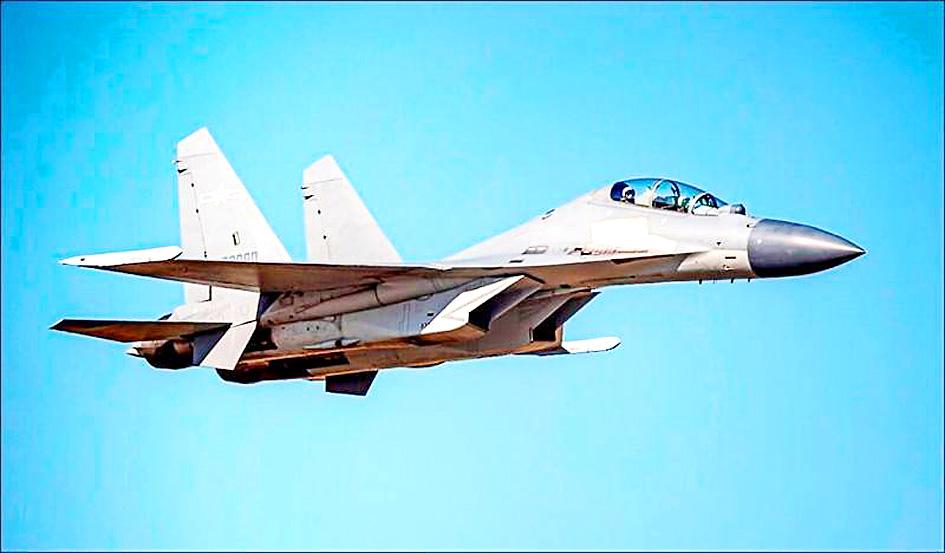US President Joe Biden’s administration on Saturday urged China to stop placing military pressure on Taiwan, while calling on both sides of the Taiwan Strait to engage in peaceful dialogue.
The statement by the US Department of State was issued after 13 Chinese military aircraft flew into Taiwan’s southwest air defense identification zone (ADIZ) on Saturday, the highest number observed in a single day this year, the Ministry of National Defense said.
The air force scrambled fighter jets to monitor the Chinese aircraft, issuing radio warnings and mobilizing air defense assets until the planes left the ADIZ.

Photo courtesy of Ministry of National Defense
The US “notes with concern” the pattern of ongoing attempts by the People’s Republic of China to intimidate its neighbors, including Taiwan, a statement issued by US Department of State spokesman Ned Price said.
“We urge Beijing to cease its military, diplomatic, and economic pressure against Taiwan and instead engage in meaningful dialogue with Taiwan’s democratically elected representatives,” it said.
“We will stand with friends and allies to advance our shared prosperity, security, and values in the Indo-Pacific region — and that includes deepening our ties with democratic Taiwan,” the statement added.
It reiterated Washington’s stance of supporting “a peaceful resolution of cross-strait issues, consistent with the wishes and best interests of the people on Taiwan.”
The statement also said that the US would continue to assist Taiwan in maintaining “sufficient self-defense capability,” as outlined in the Three Joint Communiques, the Taiwan Relations Act and the “six assurances.”
“Our commitment to Taiwan is rock-solid and contributes to the maintenance of peace and stability across the Taiwan Strait and within the region,” it concluded.
The statement was released less than a week after Biden was sworn into office.
The Ministry of Foreign Affairs yesterday said that it sincerely welcomes and thanks the Biden administration for showing support for Taiwan, and for attaching importance to Taiwan’s national defense and security, as well as peace and stability across the Taiwan Strait, soon after taking office.
The ministry would work closely with the administration, and reinforce the close partnership between Taiwan and the US by building on the foundation of their friendship, it said.
The Chinese Nationalist Party (KMT) in a statement also welcomed the US’ support, saying that Democrats have continued to uphold the cross-strait framework of the past 40-plus years, and encouraged cross-strait dialogue.
Regarding the frequent presence of Chinese military aircraft in Taiwan’s airspace, the KMT said that with the Lunar New Year holiday approaching, it urges the Chinese People’s Liberation Army (PLA) to exercise restraint, and not to cause trepidation among Taiwanese.
Chinese authorities should recognize that both sides are responsible for the “knot” in cross-strait relations, which should be resolved peacefully through political means, the party said.
It added that it hopes the governments on both sides prioritize the interests of the people.
Additional reporting by Sherry Hsiao and Lu Yi-hsuan

CHAOS: Iranians took to the streets playing celebratory music after reports of Khamenei’s death on Saturday, while mourners also gathered in Tehran yesterday Iranian Supreme Leader Ayatollah Ali Khamenei was killed in a major attack on Iran launched by Israel and the US, throwing the future of the Islamic republic into doubt and raising the risk of regional instability. Iranian state television and the state-run IRNA news agency announced the 86-year-old’s death early yesterday. US President Donald Trump said it gave Iranians their “greatest chance” to “take back” their country. The announcements came after a joint US and Israeli aerial bombardment that targeted Iranian military and governmental sites. Trump said the “heavy and pinpoint bombing” would continue through the week or as long

TRUST: The KMT said it respected the US’ timing and considerations, and hoped it would continue to honor its commitments to helping Taiwan bolster its defenses and deterrence US President Donald Trump is delaying a multibillion-dollar arms sale to Taiwan to ensure his visit to Beijing is successful, a New York Times report said. The weapons sales package has stalled in the US Department of State, the report said, citing US officials it did not identify. The White House has told agencies not to push forward ahead of Trump’s meeting with Chinese President Xi Jinping (習近平), it said. The two last month held a phone call to discuss trade and geopolitical flashpoints ahead of the summit. Xi raised the Taiwan issue and urged the US to handle arms sales to

BIG SPENDERS: Foreign investors bought the most Taiwan equities since 2005, signaling confidence that an AI boom would continue to benefit chipmakers Taiwan Semiconductor Manufacturing Co’s (TSMC, 台積電) market capitalization swelled to US$2 trillion for the first time following a 4.25 percent rally in its American depositary receipts (ADR) overnight, putting the world’s biggest contract chipmaker sixth on the list of the world’s biggest companies by market capitalization, just behind Amazon.com Inc. The site CompaniesMarketcap.com ranked TSMC ahead of Saudi Aramco and Meta Platforms Inc. The Taiwanese company’s ADRs on Tuesday surged to US$385.75 on the New York Stock Exchange, as strong demand for artificial intelligence (AI) applications led to chip supply constraints and boost revenue growth to record-breaking levels. Each TSMC ADR represents

State-run CPC Corp, Taiwan (CPC, 台灣中油) yesterday said that it had confirmed on Saturday night with its liquefied natural gas (LNG) and crude oil suppliers that shipments are proceeding as scheduled and that domestic supplies remain unaffected. The CPC yesterday announced the gasoline and diesel prices will rise by NT$0.2 and NT$0.4 per liter, respectively, starting Monday, citing Middle East tensions and blizzards in the eastern United States. CPC also iterated it has been reducing the proportion of crude oil imports from the Middle East and diversifying its supply sources in the past few years in response to geopolitical risks, expanding